Swimming to your next destination? This travel trend requires stamina and strength
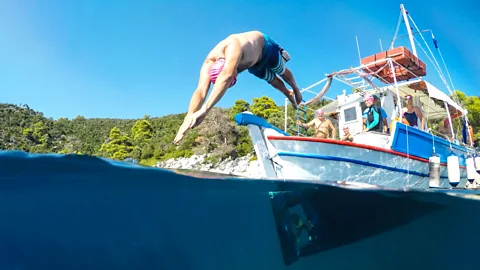 SwimTrek/ Andrew Cole
SwimTrek/ Andrew ColeSwimming holidays are the ultimate in slow travel – and since the pandemic, they've become more popular than ever.
The pale-blue copper domes of the church of Our Lady of the Rock were easy to spot as we swam across the Bay of Kotor from the picturesque fishing village of Dražin Vrt. So too were shoals of Adriatic fish: sardines, mackerel and sprats, as well as sea anemones and urchins. The water was crystal clear and almost Caribbean blue; and when my head was not in the water, the landscape was panoramic mountains.
This delightful experience was the first day of a swimming holiday in and around the Montenegro fjords. It was not a vacation that involved lying on a beach and taking the occasional dip in the sea, but one where we travelled by swimming in a group while a boat transported our gear from place to place. A swimming holiday is the ultimate in slow travel, moving through the water from island to island and cove to cove, stopping for lunch in a historic town or tiny fishing village before returning to the sea to meander further around the coastline.
For a while, it seemed that no matter how far we swam, the church sitting in the middle of the bay on a rocky promontory was not getting any closer. The swim itself was rewarding, through clear, warm waters surrounded by jagged mountains, but the goal was the islet where, according to legend, local seamen found an icon of the Madonna and Child on a rock. They then swore that after each safe journey they would add another rock until the landmass gradually emerged from the sea, crowned by a church dedicated to the Virgin Mary.
Suddenly it hove into near view and within minutes we were climbing out of the water, attracting strange glances from a wedding party gathered outside. The crew on our safety boat passed us towels and clothes, enabling us to cover up so we could enter and admire the ornately painted interior. Most people arrive by boat to this popular tourist destination, but swimming all the way there gave me some sense of the relief those fishermen must have felt when they returned home safely.
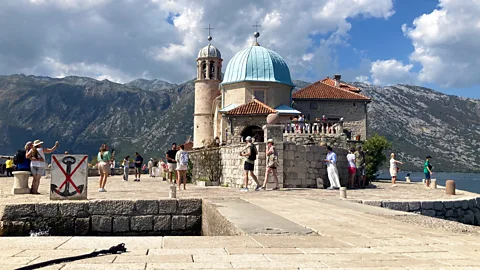 Lizzie Enfield
Lizzie Enfield"Swimming gives you a unique eye-view on the world because you are seeing it from ground or sea level," says Ella Foote, editor of Outdoor Swimmer Magazine and author of the book How to Wild Swim. "But it's also that so much of the world developed around a body of water. Most major towns and cities grew up around rivers or alongside the coast, especially when water was the main method of transportation. In the modern world we have lost what was an all-important connection with water and it's fascinating to rediscover it and approach a new place from the water that surrounds or runs through it."
Our group (we wonder, should the collective noun be "a goggle"?) was made up of 15 swimmers, drawn from around the globe and ranging in age from 20 to 60-something. In common was a love of swimming. though our abilities differed from reasonably competent pool swimmers to open water veterans and seasoned triathletes.
Set Out
Set Out is a BBC Travel series that celebrates slow, self-propelled travel and invites readers to get outside and reconnect with the world in a safe and sustainable way.
We were split into three groups of similar speeds (identifiable by different coloured swimming caps). Each group was shadowed by a small inflatable boat, while a bigger boat transported us and our gear to and from each swim, as well as providing a base for lunch, changing and anyone wanting a break. On average we swam around 5km a day; a challenging distance that requires stamina and strength, but knowing I could opt out and sit on the boat at any point somehow made that challenge easier.
Leisure swimming has long been popular in the UK, from Britain's "Lost King", Prince Henry Frederick Stuart, the older brother of Charles I, who died after contracting typhoid swimming in the Thames, to the Victorians who made sea-bathing resorts fashionable. But perhaps the greatest swimming "pioneer" was the romantic poet Lord Byron.
In 1820, a 22-year-old Byron swam across the Hellespont, a tumultuous four-mile strait in Turkey now called the Dardanelles. The swim from Troy in Greece to Gallipoli connects Europe with Asia and was famous in Greek mythology for Leander's nightly swims to meet his lover.
"I'd read Byron's accounts of his travels and the Hellespont swim and decided that's what I wanted to do for my 30th birthday," said Simon Murie, the founder of the world's first ever swimming holiday business, SwimTrek.
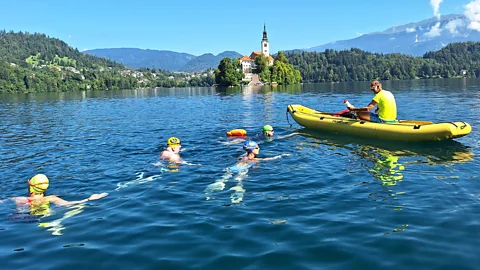 Strel Swimming
Strel Swimming"I found that the hardest part was not the swim itself but getting the necessary permissions, working out the route and finding a boat to accompany me. I realised I could not be the only swimmer wanting to swim from place to place but suspected many were put off by the organisation and so I decided to set up a business that would do all that, leaving swimmers to train and turn up."
And so, 21 years ago, SwimTrek, based on the UK south coast in Brighton, was launched to mixed reactions.
"Our first-ever trip was swimming from island to island in the Greek Cyclades. I had done all the preparation and booked accommodation, but on our first night, the hotel owner had given all our rooms away. She could not grasp the concept that we would actually be swimming there!"
The mistake was remedied, and since then SwimTrek has expanded its operations from taking 100 swimmers to four locations in that first year to more than 3,000 travellers to 40 destinations around the world in 2024. Other companies have subsequently entered the market. Some offer a similar range of trips and destinations, while others, like The Big Blue Swim, specialise in a handful of Greek Islands.
My trip to Montenegro was with Strel Swimming, which operates mainly in and around the Mediterranean. Established in 2010 by father and son Martin and Borut Strel, the company built on experience garnered surrounding Martin's epic marathon swims.
"Martin was the first person to ever swim the entire length of the Amazon River, and I worked with him as a guide and expedition leader on this and his Yangtze, Mississippi, Danube and Parana river swims," says Borut. "With all our knowledge and expertise, it made sense to open our own business. We started in Croatia and Slovenia in 2010, adding new trips and locations year on year. Swimming is a low-impact activity on the environment, and since we use local hotels, restaurants, boats and guides, our groups contribute to the local economy."
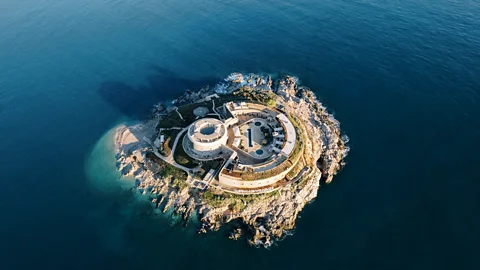 Getty Images
Getty ImagesOn the third day of our trip, we swam around Mamula Island, home to an impressive Austro-Hungarian fortress built to guard the entrance to Kotor Bay. In World War Two it was used as a concentration camp.
"I'll probably always remember that island, along with the waves and currents that changed as we swam around it, and I doubt that'd be true if I'd only seen it from the boat," said Nancy Meade, an attorney form Anchorage, Alaska. This was the second time she had come to explore Europe from the water. "The special thing about a swimming holiday is that it combines being active and outdoors all day long with a great chance to explore in a unique way. Most tourists can walk out to the seashore, and maybe even take a boat tour or cruise, but actually spending the day on and in the water and seeing the many small towns from the water is very special. Being at eye level with the shore and rocks makes you feel a part of the place much more than if you just spent a week on a boat looking around."
More like this:
• Cheese, beer and a wonderful view
• Why wild swimming is Britain's new craze
• The River Waveney: The 'secret' UK waterway most Brits don't know
The rise of the swimming holiday goes hand in hand with an increase in outdoor and open water swimming generally. In the UK, this took place after the 2012 London Olympics, which featured the first open water-swimming event. Globally, wild swimming saw another boost during the pandemic, when most indoor sport was banned.
Naturally, as with any sporting holiday, there are risks – and safeguards against them. Trained guides check locations before swims and routes are amended if the weather or water conditions are unsuitable. Safety briefings are given at the start of each swim, and guides help and encourage less confident swimmers to get the most out of their trip.
"Each trip has something special about it," says Marlys Cappaert who has worked as a SwimTrek guide for 10 years. "I really like those moments when someone overcomes a fear or tries a swim that they didn't think they could do. The joy when they succeed is giddy. And it can become quite emotional, too. In my first year, at the end of a week, one lady came to me sobbing. She shared with me that six months earlier she had received a challenging medical diagnosis and was unsure if she'd even be well enough to make our trip, let alone complete the swims. But she had. By that point, the whole group was sobbing."
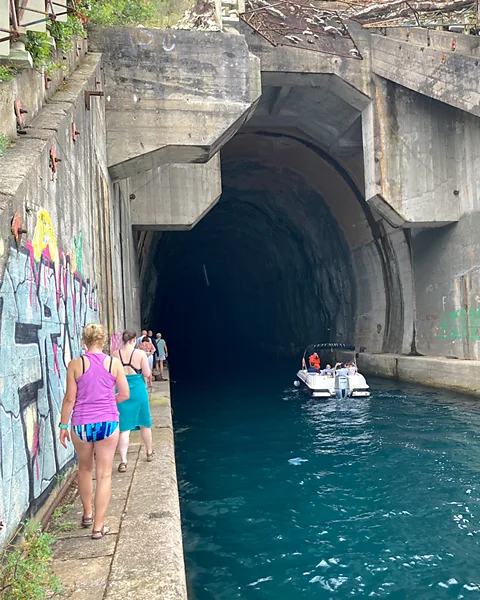 Lizzie Enfield
Lizzie EnfieldOn our final day, we made our way along the coast of the Luštica peninsula and swam into a former submarine tunnel where the Yugoslavian Navy once hid their underwater vessels, ready to emerge in the event of attack. It was eerily cold and dark inside and we were glad to emerge into daylight and head further down to the coast to the crystal-clear waters of the Blue Cave. Inside the grotto, sunlight reflected off the white-sand seabed and rendered the waters a shimmering turquoise. A few motorboats with tourists taking photos hovered near the mouth of the cave as we swam deep inside relishing the unique experience our mode of travel afforded us.
As the great swimmer Lord Byron wrote in his poem Childe Harold's Pilgrimate:
'There is a pleasure in the pathless woods,
There is a rapture on the lonely shore,
There is society where none intrudes
By the deep Sea, and music in its roar'
--
If you liked this story, sign up for The Essential List newsletter – a handpicked selection of features, videos and can't-miss news, delivered to your inbox twice a week.
